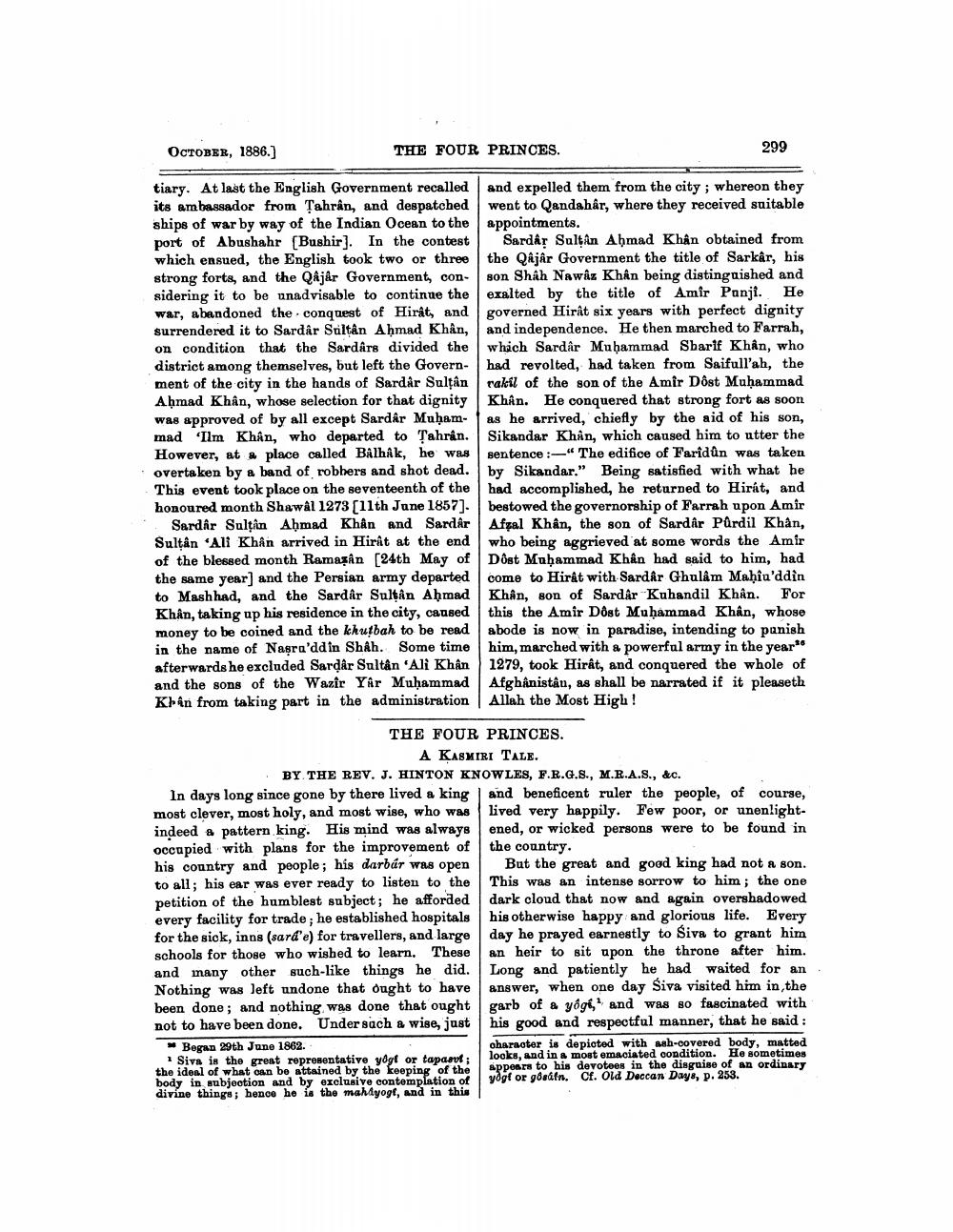________________
OCTOBER, 1886.)
THE FOUR PRINCES.
299
tiary. At last the English Government recalled and expelled them from the city ; whereon they its ambassador from Țahrân, and despatched went to Qandahår, where they received suitable ships of war by way of the Indian Ocean to the appointments. port of Abushahr Bushir]. In the contest Sardar Sultan Ahmad Khan obtained from which ensued, the English took two or three the QAjâr Government the title of Sarkar, his strong forts, and the QAjár Government con- son Shah Nawaz Khân being distinguished and sidering it to be unadvisable to continue the exalted by the title of Amir Panji. He war, abandoned the conquest of Hirat, and governed Hirat six years with perfect dignity surrendered it to Sardar Sultan Ahmad Khân, and independence. He then marched to Farrah, on condition that the Sardars divided the which Sardar Muhammad Sharif Khân, who district among themselves, but left the Govern had revolted, had taken from Saifullah, the ment of the city in the hands of Sardar Sultan rakil of the son of the Amir Dôst Muhammad Ahmad Khân, whose selection for that dignity Khân. He conquered that strong fort as soon was approved of by all except Sardar Muḥam- as he arrived, chiefly by the aid of his son, mad 'Ilm Khân, who departed to Tahran. Sikandar Khân, which caused him to utter the However, at # place called BalhAk, he was sentence :-" The edifice of Faridůn was taken overtaken by a band of robhers and shot dead. by Sikandar." Being satisfied with what he This event took place on the seventeenth of the had accomplished, he returned to Hirát, and honoured month Shawal 1273[11th June 1857]. bestowed the governorship of Farrah upon Amir
Serdâr Sultan Ahmad Khân and Sardar Afzal Khân, the son of Sardar Pürdil Khân, Sultân 'Ali Khan arrived in Hirât at the end who being aggrieved at some words the Amir of the blessed month Ramazan (24th May of Dôst Muhammad Khân had said to him, had the same year) and the Persian army departed come to Hirât with Sardar Ghulâm Mahîu'ddin to Mashhad, and the Sardar Sultan Ahmad Khân, son of Sardar Kuhandil Khân. For Khân, taking up his residence in the city, caused this the Amir Dost Muhammad Khan, whose money to be coined and the khutbah to be read abode is now in paradise, intending to panish in the name of Naşra'ddin ShAh. Some time him, marched with a powerful army in the year" afterwards he excluded Sardár Sultan Ali Khân 1279, took Hirât, and conquered the whole of and the sons of the Wazir Yar Muhammad Afghênistâu, as shall be narrated if it pleaseth Khan from taking part in the administration Allah the Most High!
THE FOUR PRINCES.
A KASMIRI TALE. BY THE REV. J. HINTON KNOWLES, F.R.G.S., M.R.A.S., &c In days long since gone by there lived a king and beneficent ruler the people, of course, most clever, most holy, and most wise, who was lived very happily. Few poor, or unenlightindeed a pattern king. His mind was always ened, or wicked persons were to be found in occupied with plans for the improvement of the country. his country and people; his darbár was open But the great and good king had not a son. to all; his ear was ever ready to listen to the This was an intense sorrow to him; the one petition of the humblest subject; he afforded dark cloud that now and again overshadowed every facility for trade; he established hospitals his otherwise happy and glorious life. Every for the siok, inns (sard'e) for travellers, and large day he prayed earnestly to Siva to grant him schools for those who wished to learn. These an heir to sit upon the throne after him. and many other such-like things he did. Long and patiently he had waited for an Nothing was left undone that ought to have answer, when one day Siva visited him in the been done; and nothing was done that ought garb of a yogi," and was so fascinated with not to have been done. Under such a wise, just his good and respectful manner, that he said : Began 29th June 1862.
oharacter is depicted with ash-covered body, matted Siva in the great representative yogt or tapaout ;
looks, and in a most emaciated condition. He sometimes the ideal of what can be attained by the keeping of the
appears to his devotees in the disguise of an ordinary body in subjootion and by exclusive contemplation of
yogf or g8edfr. cf. Old Deccan Days, p. 253. divine things; hence he is the mahayogf, and in this




